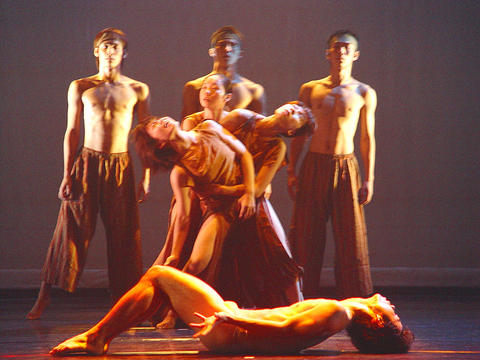Next weekend, an eclectic gathering of Taiwanese dancers will perform works by Taiwanese, Japanese and American choreographers in honor of dance legend Tsai Jui-yueh (蔡瑞月) outside the rebuilt Japanese-style studio that was her base in Taipei for decades.
The 12 works on the program are a reflection of Tsai's saga. Tsai, who died two years ago in Australia aged 84, is known as the founder of modern dance in Taiwan, but her life mirrored the history of this land.
Tainan-born Tsai defied her family with her passion for dance growing up, but her parents agreed to let her leave for Japan in 1937, aged 16, to study at a Tokyo academy run by renowned dancers Ishii Baka and his daughter, Ishii Midori.

PHOTO: COURTESY OF TESIJUI-YUEH DANCE FESTIVAL
Three of the pieces on the program were choreographed by Ishii and four are by Ishii Midori, now 95, who will be in Taipei for the performances. Her daughter, Orita Katsuko, who is 75, will perform a solo piece.
Tsai did not return to Taiwan until after World War II ended. Like many Taiwanese of the time, she spoke only Japanese and Hoklo (also known as Taiwanese). In 1947 she married poet and National Taiwan University literature professor Lei Shih-yu (雷石榆), who had helped her as a Mandarin translator. But Lei was arrested in 1949 and expelled to Guangdong Province, leaving Tsai and their year-old son behind. Tsai was detained a few months later and served three years as a political prisoner on Green Island.
She reopened her dance school in 1953 and in 1964 she established the China Dance Club Studio, which at its peak had eight branches around Taiwan.
While Tsai gained international attention for her work, the government kept her under close watch and barred her from traveling abroad. In 1983, however, she was able to immigrate to Australia, where her son worked for the Australian Dance Theatre. They left behind daughter-in-law Ondine Hsiao (蕭渥廷) to run the school.
The struggle of Tsai, and countless others, during the White Terror and Martial Law eras will be commemorated by American dance master Eleo Pomare's 2004 work, Tables.
Tsai's family connections will be marked by pieces by Ondine Hsiao and a new piece by her US-based younger sister, Grace Hsiao, set to music composed by Grace's husband, David Maurice.
More than 20 dancers from several companies will take part in the festival. Seating for the performances will be outside and the organizers said they are prepared for inclement weather.

On April 26, The Lancet published a letter from two doctors at Taichung-based China Medical University Hospital (CMUH) warning that “Taiwan’s Health Care System is on the Brink of Collapse.” The authors said that “Years of policy inaction and mismanagement of resources have led to the National Health Insurance system operating under unsustainable conditions.” The pushback was immediate. Errors in the paper were quickly identified and publicized, to discredit the authors (the hospital apologized). CNA reported that CMUH said the letter described Taiwan in 2021 as having 62 nurses per 10,000 people, when the correct number was 78 nurses per 10,000

As we live longer, our risk of cognitive impairment is increasing. How can we delay the onset of symptoms? Do we have to give up every indulgence or can small changes make a difference? We asked neurologists for tips on how to keep our brains healthy for life. TAKE CARE OF YOUR HEALTH “All of the sensible things that apply to bodily health apply to brain health,” says Suzanne O’Sullivan, a consultant in neurology at the National Hospital for Neurology and Neurosurgery in London, and the author of The Age of Diagnosis. “When you’re 20, you can get away with absolute

May 5 to May 11 What started out as friction between Taiwanese students at Taichung First High School and a Japanese head cook escalated dramatically over the first two weeks of May 1927. It began on April 30 when the cook’s wife knew that lotus starch used in that night’s dinner had rat feces in it, but failed to inform staff until the meal was already prepared. The students believed that her silence was intentional, and filed a complaint. The school’s Japanese administrators sided with the cook’s family, dismissing the students as troublemakers and clamping down on their freedoms — with

As Donald Trump’s executive order in March led to the shuttering of Voice of America (VOA) — the global broadcaster whose roots date back to the fight against Nazi propaganda — he quickly attracted support from figures not used to aligning themselves with any US administration. Trump had ordered the US Agency for Global Media, the federal agency that funds VOA and other groups promoting independent journalism overseas, to be “eliminated to the maximum extent consistent with applicable law.” The decision suddenly halted programming in 49 languages to more than 425 million people. In Moscow, Margarita Simonyan, the hardline editor-in-chief of the